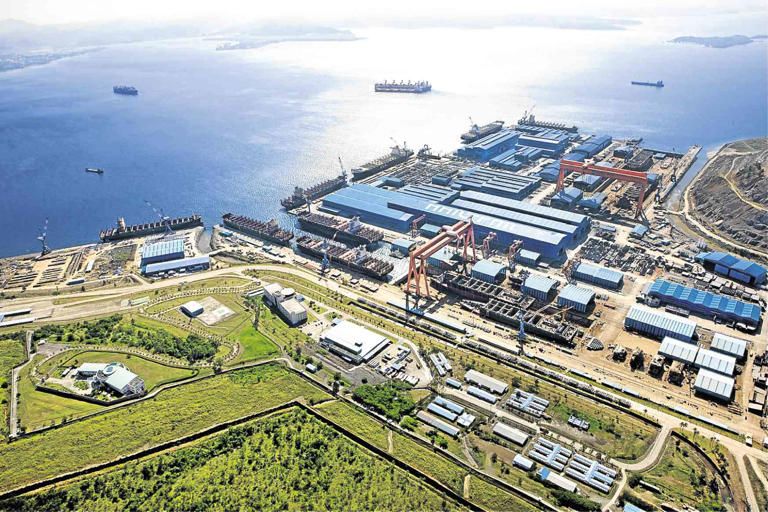From its busiest days as the fifth largest supplier of all types of ships in the world, the Subic Bay shipyard, now under the joint venture of Korean firm HG Hyundai Heavy Industries and US venture capitalist Cerberus Capital Management, now vows to revive those glorious moments for the partners and for the country.
It was the world’s fourth largest shipyard with 21,000 employees as of September 2011.
President Ferdinand “Bongbong” Marcos, Jr. excitedly announced this development after meeting with the partners on Tuesday at the Palace, saying the “fresh investments of HG Hyundai Heavy Industries (HHI) in Subic will help the country finally achieve its goal of becoming the top shipbuilder in the world.”
The chief executive made the remark during the announcement of Cerberus and HD Hyundai’s partnership in Subic.
“With this initiative of Cerberus and HG Hyundai, we will have a fresh start and a strong foundation in realizing our vision to be amongst the largest and most consequential shipbuilders in the world,” Marcos said in his speech at the event.
The shipyard was founded and developed by Korea’s Hanjin Heavy Industries Construction, also known as HHIC (the Philippine company was known as HHIC Phil) in February 2006 and that same month had its first shipbuilding contract for four container ships.
The construction of the shipyard (with two large docks) began in Redondo Peninsula, on the western edge of Subic Bay.
The first vessel "Argolikos" was delivered in July 2008 to the Greek ship owner Dioryx. As of April 2011, HHIC Phil shipyard had delivered 20 ships and then in 2013, the first oil tanker and in 2016 the first gas carrier. It also made CALM buoys for the Malampaya gas field offshore project.
Hanjin filed for bankruptcy in January 2019 after defaulting on its obligations worth $412 million to five local banks.
The company's workforce was expected to increase to nearly 28,000 in 2016 but a slump in shipbuilding projects limited the workforce to 20,000 as of 2017. By September 2017, the company had the largest shipyard in the Philippines and was one of the largest private employers in the country.
By November 2018, the company delivered two completed 114,000 deadweight ton crude oil tankers. But with 20 vessels in different stages of construction then, the company could not service its high debts or get further extensions from its lenders.
Australian shipbuilder Austal and Cerberus launched a joint bid for the Subic shipyard but Austal later dropped its bid. Agila Subic became Cerberus' new partner, taking over the shipyard's operations in March 2022. Agila Subic is a Dutch venture consisting of four companies that are affiliates of Cerberus. Accordingly, the shipyard was renamed the Agila Subic Multi-Use Facilities.
The Philippine Navy began leasing the shipyard’s northern section in May 2022 and American defense contractor Vectrus also moved in.
Cerberus completed its acquisition of the shipyard by April 2022.
Marcos said the Philippines was only the seventh largest shipbuilder in the world, contributing almost 400,000 gross tons of newly built sea and ocean-going vessels.
Hyundai is the second largest shipbuilding companies in the world and is a major heavy equipment manufacturer.
Aside from shipbuilding, HHI is also expected to boost the country’s access to renewable energy.
“HG Hyundai’s initial focus on the development of offshore wind platforms holds well for our goal through transitioning to renewable energy,” Marcos said.
Cerberus, the President said, is expected to invest in microelectronics, semiconductors, and critical metals.
“The investments that will be created hereafter are especially beneficial to Subic because these will strengthen the Freeport area’s vital role as a hotspot for industrial, commercial, and other economic activities,” Marcos said.
During the President’s meeting with Cerberus top executives in May 2023, it was announced that HHI will be using two drydocks in Subic for shipbuilding and will employ 5,000 to 15,000 workers.
He urged HG Hyundai to partner with the Commission on Higher Education (CHED) and Technical Education and Skills Development Authority (TESDA) for the development of talented workforce for its shipyard.
It was also announced that Cerberus plans to convert the Subic International Airport into a cargo and logistics hub.
#WeTakeAStand #OpinYon #CHED #TESDA #Hyundai #CerberusCapitalManagement #SubicShipyard
